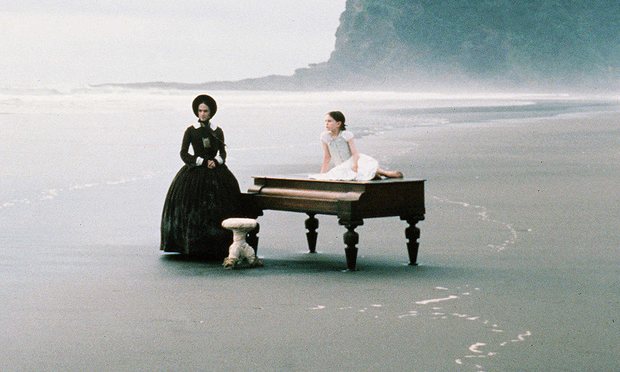32. The Piano, directed by Jane Campion
Unfastening Your Desires
By Rose Marel
Surpassing the limitations of conventional film genre, The Piano presents a brave story of sensuality, identity and self-expression. It’s unusual, it’s unsettling and it’s deeply moving, the kind of film that haunts you beyond its close. Gathering a plethora of prestigious awards and nominations when released in 1993 – for acting, screenwriting, directing, music and costume – Campion’s movie captured the attention of audiences worldwide. Even today, its story remains unexpected and resonant.
The voice-over of a child’s sweet voice rubs against the image of a woman, severely clad in 19th Century garb. It’s inexplicably unnerving, and colours The Piano with a darkness that accentuates itself within a somewhat gothic aesthetic. This mood becomes more pronounced when the voiceover asserts itself as that of the woman – her mind’s voice – last used at six years old. From here on, mystery is permanently bound to the story. Ada (a remarkable Holly Hunter) is mute, although she doesn’t know why, and is shipped with her daughter Flora (a 9-year-old Anna Paquin) from Scotland to New Zealand to meet her new, arranged husband Alisdair (Sam Neill).
Ada uses a form of invented sign-language to communicate with her daughter, who not only seems to understand just fine but also translates with the appropriate force of her mother’s words. A spirited woman, she conveys herself through hard stares and distinct gestures. The other, more visceral method of communication for Ada, however, is her piano. Her fingers caressing the keys, she unpours her emotions and, in turn, allows her voice to be heard through music. The piano is like another limb, and when she’s forced to leave it behind upon arrival, it rips Ada apart. The remoteness of their new home, steeply topographical and characterised by thick mud and jungle, further underscores the sense of claustrophobia.
Everything piles atop the other. The repression of a mute life – a life isolated by your own thoughts – coupled with the literal isolation, is highly oppressive. A corset doesn’t help, either! The viewer can sense it, and within this stifling atmosphere the story begins to cut an unexpected path. After convincing one of her husband’s friends, George (Harvey Keitel), to rescue her piano, it remains there, repaired but captive in his hut. Demanding piano lessons as an excuse to hear her play, he becomes seduced by the music, as well as the mysterious woman producing it. Through her music she creeps inside him, captivating him until a fetish-like obsession develops.

Setting the film in 1850 is an especially radical choice. The duality between restriction and freedom is all the more effective, and the smallest hints of skin are suddenly charged with sensuality and innuendo. Playing with these ideas and the nature of fetishism, their unusual (and blackmail induced) courtship is at times quite disturbing. Weighing up the difference between love and lust within this context is also an idea for the audience to consider.
For Ada, suppressed in so many ways, hers and George’s relationship becomes a form of self-actualisation. Once a prisoner in her own body, she now begins to unlock herself. To have an affair in this age is a very deliberate act. The onion-like garments and dummy-proof fastenings meant that no explanation of “it just happened” will fly. Thus, the potential repercussions may be heightened.
Like the other Australasian films reviewed as a part of the 52 Films by Women initiative (see: The Dressmaker, Proof and Somersault), The Piano is an audacious film both in its story and the way it’s told. The audience are respected as assumed brain-holders, tolerant of mystery and armed with enough creative reasoning to draw our own conclusions. It plays with dark and unusual themes that it pushes into the light, provoking us in this process. The Piano manages to seep into your core and imbue us with feelings of conflict. It’s a refraction of Ada’s abilities with a piano, that way she can “creep into you” with a sound.

The titular character is portrayed in full-force by Holly Hunter, who deservedly won an Oscar for the role. Campion reveals Ada to be a contradiction of strength and vulnerability, like a swan that either shyly cowers or powerfully snaps back when threatened, while her command of the piano is an act of grace. Incredibly, Hunter played the piano sequences, having learnt the instrument from a young age. It should be noted also that Paquin won the Oscar for Best Supporting Actor at eleven years old, the second youngest in history.
Campion never allows us to be fooled by Ada’s muteness. Her silence is merely a lid to her deep tumbling of thoughts, evidenced by her piano’s rapid polyrhythms and moody improvisations. We glimpse into a darkness that lives inside her, and a richness. More than self-acceptance for Ada, it’s self-discovery, and a continued unfolding of human capacity. At first she seems resigned to certain limits, but it’s in exploring these that she begins to inwardly expand.